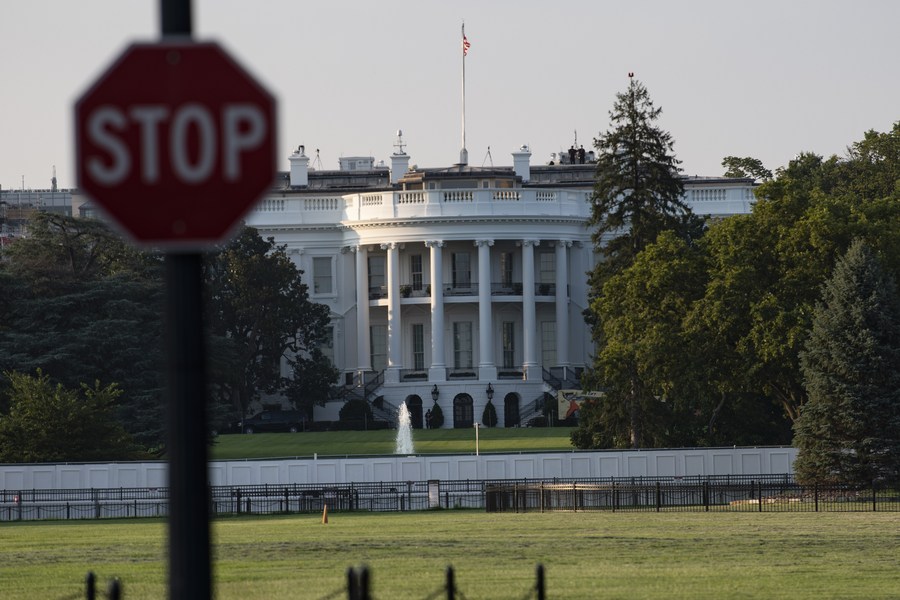
Photo taken on Aug. 10, 2020 shows the White House in Washington, D.C., the United States. (Xinhua/Liu Jie)
BEIJING, Sept. 4 (Xinhua) -- Nothing could be more ridiculous than U.S. Secretary of State Mike Pompeo declaring last month that the United States would launch a five-pronged effort under the so-called "Clean Network" program to protect U.S. assets.
Under this initiative, the United States will seek to remove "untrusted" Chinese apps such as TikTok and WeChat from U.S. mobile app stores, limit the ability of Chinese cloud service providers like Alibaba, Baidu and Tencent to access cloud-based systems in the United States, and ensure undersea cables "are not subverted for intelligence gathering" by China.
Pompeo has been mongering his "China threat" theory around the world, urging others to guard against China "stealing user data." But what about the track record of the United States in this regard?
When it comes to telecom theft, the United States has always ranked first in the world. In addition to pressuring AT&T, Verizon and other carriers for their data, the National Security Agency (NSA) has been using fake base stations named Dirtbox in its wiretapping programs including the Boundless Informant since more than a decade ago. Through Dirtbox, they simulate signals of base stations to tap into and steal data from cellphones. As French newspaper Le Monde reported, thanks to Dirtbox, data from 62.5 million phones was collected by the United States in France.
Pompeo has been accusing TikTok, WeChat and other apps of being tools for the Chinese government's "infiltration." But in reality, the United States is the one that is adept at turning apps into surveillance units. Leaked documents of PRISM revealed that the NSA sees apps as "data mines" with huge reserves of data to be harvested and thus invests heavily to this end. Under the agency's pressure, Twitter, Facebook, YouTube, Skype, Google Maps and even Angry Birds were forced to cooperate with the NSA.
An "innovative move" by U.S. intelligence is to steal secrets through the app store. As revealed by the Canadian Broadcasting Corporation, the NSA and intelligence agencies of other Five Eyes countries initiated Project Irritant Horn, which hijacks the Play Store to implant spyware on target smartphones or exploit loopholes. With this program, the Five Eyes managed to steal massive amounts of data.
As for Clean Cloud, the United States is the real gangster of "cloud theft." The Washington Post exposed that the NSA, along with the Government Communications Headquarters of Britain, launched a surveillance program called Muscular to frequently break into the cloud servers of Google and Yahoo. They even went so far as to intercept data and direct it to the agencies' own database. This was how hundreds of millions of personal information records were collected.
According to the New Zealand Herald, the United States had conspired with the New Zealand intelligence agencies to tap the data flowing in the Chinese consulate general in Auckland. Documents leaked by former NSA contractor Edward Snowden show that the U.S. surveillance program, codenamed Stateroom, ordered the installment of secret signals intelligence equipment in around 100 foreign diplomatic embassies and consulates in other countries for the purpose of spying.
The United States conducts wire-tapping and mass surveillance around the globe, and these wrongful acts are already an open secret. It is preposterous that the secretary of state of a country guilty of such rampant cyber theft would have the audacity to propose the building of a "Clean Network."
The U.S. move comes on the back of an all-embracing paranoia to portray Chinese technologies as a threat to U.S. national security, which lacks both evidence and reason.
As it turns out, many Chinese companies subject to unilateral U.S. sanctions are innocent, providing safe technologies and products to customers around the world. Not a single cybersecurity incident like those revealed by Edward Snowden or WikiLeaks has been related to one of these companies, nor a single tapping or surveillance operation like PRISM, Equation Group or ECHELON.
In the views of certain U.S. politicians, "national security" is a one-size-fits-all pretext for the country to stir up troubles and oppress non-U.S. companies. They claim that companies like TikTok threaten to undermine U.S. national security, but how could TikTok, a social media app for young people to share light-hearted videos of themselves singing and dancing, pose a national security threat to the world's sole superpower?
Even a U.S. Central Intelligence Agency assessment says there is no evidence that China intercepted TikTok data or used the app to bore into cell phones.
The U.S. politicians claim that Huawei threatens U.S. national security, which is totally baseless. Over the past 30 years, Huawei has developed over 1,500 networks in more than 170 countries and regions, and served 228 Fortune 500 companies and more than 3 billion people all over the world. Not a single country has produced evidence of any back doors in Huawei products.
The United States has long prided itself on being the champion of the free market economy, but its politicians have recently shown the world that they are willing to cast aside rules and fairness in the pursuit of hegemony and self-interest.
In fact, with fresh memories of the Alstom, Toshiba and Siemens precedent, most countries in the world have a clear understanding of the "U.S. trap" of eliminating competitors.
Some U.S. politicians hunting down non-U.S. companies constitutes organized and systematic economic bullying of non-U.S. companies that take the lead in their field. It is blatant economic hegemony in the worst form.
As Chinese foreign ministry spokesperson Zhao Lijian said, in their eyes, the so-called "Internet liberalization" is nothing but the "Americanization of the Internet." The term "national security" is simply a byword for "American double standards." ■



